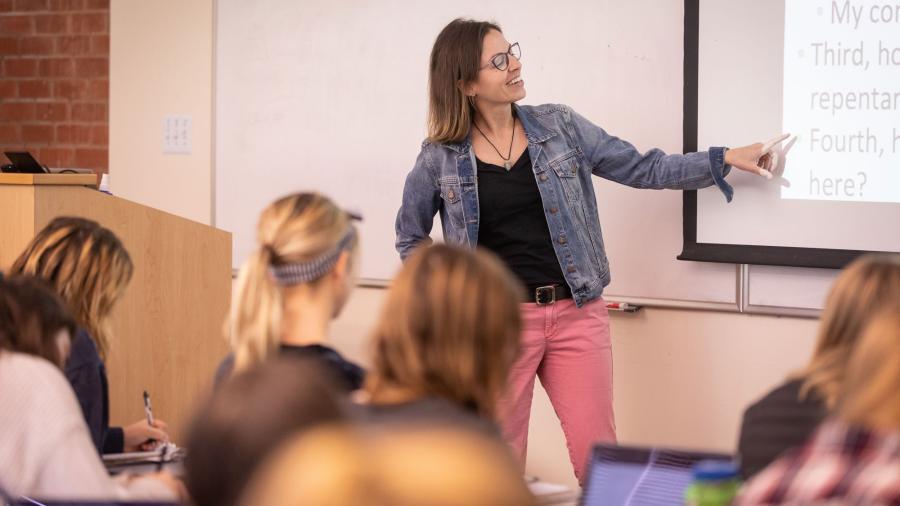Office of the Registrar General Education
- Mission Statement
- Currently Approved General Education Courses
- General Education FAQs
- ALEKS Placement Guidance (math assessment)
- Language Placement FAQs
- To take the Language Placement Assessment, click here.
Introduction to General Education - Our Philosophy
In the tradition of the liberal arts, Westmont’s academic program requires students to set their major programs of study within the larger context of General Education. The General Education framework ensures that students’ major programs will be supported by the skills, the breadth of knowledge, the strategies of inquiry, and the practices that will enable them to mature in wisdom throughout their lives and to apply their learning effectively in the world around them.
As a liberal arts college in the Christian tradition, we ground our pursuit of learning and wisdom in the context of God’s revelation—manifested in the scriptures and in the world around us, and apprehended through reason, observation, experimentation, and the affections. Through the General Education program, students develop the necessary contextual background, concepts, vocabulary, and skills to support their exploration of these various avenues to understanding the world.
In addition to developing knowledge and skills, our general education curriculum at Westmont seeks to inspire students to become constructive agents of redemption in a diverse and complex world. Thus, the General Education program provides opportunities for students to encounter a variety of viewpoints, cultures, and languages. Finally, we offer students the opportunity to practice their learning in the context of concrete experiences that facilitate the acquisition of wisdom, empathy and practical expertise.
Westmont students grow in ways that reflect the rich diversity of God's created order. But students are nourished by a common grounding that provides a shared context for growth in the Christian liberal arts tradition. As they grow in faith, students become rooted in the canon of the Old and New Testaments and in theological understanding. As they grow in skill, students cultivate their ability to write cogently, to reason mathematically, to converse in a language other than their native tongue, and to be fit stewards of their bodies. As they grow in knowledge, students increase their ability to grasp world history, to read and analyze discerningly from a Christian perspective, and to distinguish truths and values as they think through issues of eternal significance.
Recognizing the breadth of their heritage, Westmont students explore a variety of the branches of human knowledge and inquiry. Such exploration necessarily involves choice. In choosing courses, students will encounter some disciplines and not others. But the array of options within the general education program ensures that in reaching out to a wide variety of specific branches, each student will grasp something of the rich diversity of human learning as an organic whole. By becoming familiar with the vocabularies and types of questions asked in several disciplines, students equip themselves to be members of an increasingly global and diverse intellectual community.
Students encounter their heritage through courses labeled Common Contexts, Common Inquiries, and Common Skills. Each Common Contexts class grounds students in a body of material and explicitly invites them into an understanding of the Christian liberal arts. Each Common Inquiries class empowers students to explore the knowledge, methodologies, and modes of inquiry of a given discipline. Each Common Skills class encourages students to develop their verbal, quantitative, or physical dexterity. Once students have appropriated this heritage, they are asked to begin contributing to it through courses labeled Compassionate Action.
As they grow deeper in the common ground they share with other members of the community, Westmont students also master the methods and knowledge of their chosen majors. But a Christian liberal arts education is more than an intellectual exercise; students must incarnate their emerging maturity in compassionate action. Living out what one has learned not only embodies the liberal arts tradition, which has always sought to produce informed and capable citizens, but also the Christian tradition, in which faith is demonstrated through works.
Reflecting the rich diversity of creation, such blossoming may take many different forms. It may emerge from and be demonstrated within the student’s major field of study, or within academic work outside the major. Students demonstrate the capability not just to know but to do, not just to study but to perform, not just to speak clearly but to communicate cross-culturally, not just to recognize right but to enact justice. A student completing general education and a major field of study leaves Westmont ready to live out the good news of Christ and the empowerment of education. However difficult it may be to acquire, a Christian liberal arts education exists to be given away, for free, in a lifetime of competent, compassionate service to God and to others.
